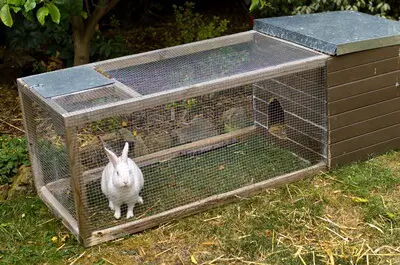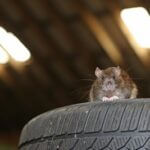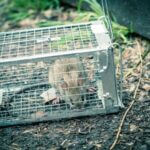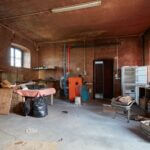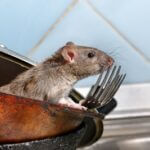Rats have a highly developed sense of smell that allows them to detect food sources from a long distance. Moreover, rodents are opportunistic and skilled at finding food, shelter, and warmth.
This makes rabbits especially vulnerable to rats. An outdoor hutch built for your pet rabbit will offer all the elements a rat needs: food, water, warmth, shelter, and protection.
Do Rabbits Attract Rats?
The presence of rabbits can lure rats due to the food, water, and poop found in a hutch.
Once rats are drawn to rabbits, they’ll likely remain for shelter and warmth. This is especially true for outdoor hutches, which shelter rabbits from wind, rain, and low temperatures.
The bedding will be comfortable, retain heat, and safeguard the area from predators. So, rats may arrive for food and water but remain due to the suitability of the habitat.
This can happen even in the tidiest of rabbit pens, but it’s more likely if an enclosure is unsanitary or rarely cleaned. Even if no leftover food is present, rabbit droppings and urine attract hungry rats.
According to the Journal of Comparative and Physiological Psychology, rats consume their droppings and those of other animals.
If you feed your rabbit a nutrient-rich diet, its high-quality droppings can be inviting for rats.
Can Rats Harm Rabbits?
Rats can harm pet rabbits, which is more likely as the rat population increases.
For instance, rats are more likely to attack, kill, and eat newborn rabbits if there isn’t enough food in their surroundings. A single rat won’t need to struggle for resources in a rabbit pen, but after a couple of litters, competition for meals will increase, and the rabbits can suffer.
Adult rabbits are much larger than rats and harder for rodents to kill. Most rats will run away or hide instead of confronting an adult and only attack when threatened.
Rabbits aren’t naturally aggressive, so conflicts are unlikely in lower-population infestations.
That said, rats harbor many pathogens. They can transmit deadly illnesses that do far more damage than a simple bite, so a rabbit may be vulnerable to catching:
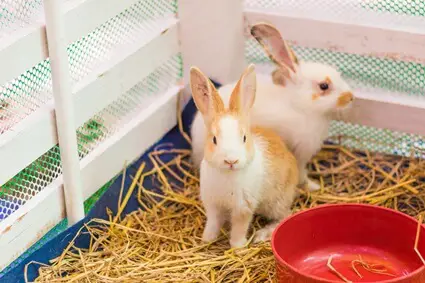
Rat Bite Fever
Rat bite fever (RBF) is a bacterial infection transmitted to other animals when a rat bites or scratches another animal.
According to Clinical Microbiology Reviews, RBF is caused by the streptobacillus moniliformis bacteria. The infection has a high mortality rate, with up to 10% of rat bite fever cases being fatal.
If a rabbit has been scratched or bitten by a rat, take it to a vet immediately. It must treat its wounds and receive preventive treatment to prevent a rat bite fever infection.
If you find rats in a rabbit’s pen but can’t spot any injuries, contact a vet to be safe, especially for long-hair rabbit breeds, which can hide wounds.
Salmonellosis
Salmonella infection is often associated with the consumption of undercooked chicken. However, the illness can also be transmitted by rats.
These rodents carry salmonella bacteria in their bodies, spreading through their secretions. If an infected rat enters a rabbit’s hutch, it’s likely to contaminate its food and water with droppings.
This poses a serious health risk for a rabbit, as it can become ill if it eats contaminated food and water.
Leptospirosis
Leptospirosis is an infection caused by the leptospira bacteria, which is primarily found in rat urine. Pet rabbits can contract this disease if they drink water contaminated by an infected rat.
The common symptoms of leptospirosis include:
- Fever.
- Abdominal pain.
- Muscle pain.
- Chills.
How to Remove Rats If You Have Rabbits
If you own rabbits, spraying pesticides or fumigating the hutch isn’t the right choice. You’re just as likely to harm your rabbits as you are to exterminate the rats.
However, you can’t leave the rats to begin populating. So, here are some alternatives:
Bait Stations
Bait stations are small plastic or wooden boxes with tiny holes that allow rodents and other pests to enter. Poisonous bait is kept inside the bait station, so any rodent that consumes it dies.
Depending on the size of your pet rabbits, these can be a safe alternative.
The rabbit won’t be able to enter the station, but a rat will. However, if your rabbit is a small breed, you should avoid putting the bait station near them.
For better results or to avoid harming smaller rabbits, you can hide the bait station in a corner where your rabbit can’t reach it, but a rat can. Most rats don’t sleep in the same area as rabbits since they’re skittish animals and fear being confronted.
They’re likely to nest somewhere close but out of sight. If you can place the bait station near this spot, the rats will likely access it, but your rabbit will be barred from entry.
Usually, the poisoned rat doesn’t die immediately but falls sick and dies over 2-3 days. During this time, the poisoned rats carry bits of contaminated bait to their nests and share them with other rats. If you can’t find the nest, it’s an ideal option.
Traps
Rat traps are intended to capture rodents, either alive or dead. This is ideal if you don’t want dead rats lingering in unseen places or need to confirm the number of rats affected.
However, you must place these traps where your rabbit can’t access them. When placed around the hutch, traps are effective in two designs.
Glue traps, for instance, are made of sticky material that clings to the rats’ feet as they walk on the mats, trapping rats without killing them.
Snap traps operate through a spring mechanism, which causes a metal bar to snap down and kill the rodent when activated.
How to Prevent Rats from Invading Your Rabbit Hutch
It’s easier (and safer for your rabbit) to prevent a rodent infestation than getting rid of one. Here are some tips you can apply to ensure rats don’t get into a rabbit hutch:
Regularly Clean The Hutch
Unsanitary hutches create strong smells, offer ample food for rats, and allow them to spread disease. So, the cleaner your rabbit’s enclosure, the less appealing it’ll be to rodents.
Rats may not smell the pen and know how to approach it. At the least, they’ll have little to eat if they show up. This reduces the chances of nesting and breeding, even if a couple stays for shelter.
Keeping the area around the pen tidy will drive off scouting rats, as they’ll need to travel greater distances to find food, and rats prefer to eat near their shelters.
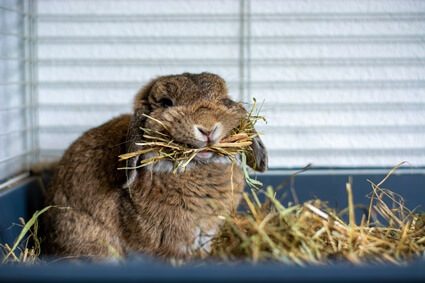
Do Not Leave Food In The Open
Leaving food out for rabbits to eat is a convenient way to ensure your pets stay fed. Unfortunately, this can also attract rats looking for a free meal.
After feeding your rabbit, clean up fruits, veggies, and other foods. Always store leftover food safely, and clean your rabbit’s feeding bowl after every meal to avoid luring scents.
Rat-Proof The Hutch
Rats are intelligent and inventive creatures that can find their way inside any hole with a diameter larger than ½ an inch. Rats can easily squeeze through a rabbit’s hutch with openings or cavities.
Check the walls of the rabbit hutch for cracks, holes, and crevices, and seal them off.
You can use caulk, cement, plaster, steel wool, mesh ware, or aluminum foil. Alternatively, place the hutch on a raised platform, at least 2-3 feet from the ground, making it harder for rats to access it.
Trim Overgrown Grass and Bushes
An unkempt yard attracts rats since it provides many areas in which to hide and nest.
If your yard has overgrown bushes, hedges, and grass, rats might hide under them during the day and come out at night to scout for a meal, which can lead them to a rabbit’s hutch.
Regular yard maintenance and cleaning will deprive rats of safe hiding spots.

